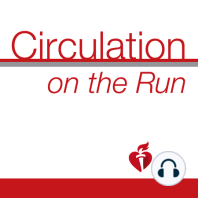17 min listen
Circulation December 7, 2021 Issue
ratings:
Length:
23 minutes
Released:
Dec 7, 2021
Format:
Podcast episode
Description
Please join Guest Host Mercedes Carnethon along with first author Connie Hess and Guest Editor Gregory Lip as they discuss the article "Reduction in Acute Limb Ischemia With Rivaroxaban Versus Placebo in Peripheral Artery Disease After Lower Extremity Revascularization: Insights From VOYAGER PAD." Dr. Carolyn Lam: Welcome to Circulation on the Run, your weekly podcast summary and backstage pass to the journal and its editors. We're your co-hosts. I'm Dr. Carolyn Lam, associate editor from the National Heart Center and Duke National University of Singapore. Dr. Greg Hundley: And I'm Dr. Greg Hundley, associate editor, director of the Poly Heart Center at VCU Health in Richmond, Virginia. Dr. Carolyn Lam: Greg, our feature discussion is on a really important topic, peripheral artery disease. So important, so rampant, not talked about enough. And it's really insights from the VOYAGER-PAD trial telling us about the reduction in acute limb ischemia with Rivaroxaban versus placebo in peripheral artery disease after lower extremity revascularization. But before we get into all that, I want you to get your coffee while I tell you about my picks of today's issue. Should I start? Dr. Greg Hundley: Very good. Dr. Carolyn Lam: Okay. So the first paper deals with the residual ischemic risk following coronary artery bypass grafting surgery. We know that despite advances, patients following CABG still have significant risk. So this paper refers to a subgroup of patients from the REDUCE-IT trial with a history of CABG, which was analyzed to evaluate the efficacy of icosapent ethyl treatment in the reduction of cardiovascular events in this high risk patient population. Now, as a reminder, the REDUCE-IT trial was a multicenter, placebo controlled, double blind trial, where statin treated patients with controlled LDL cholesterol and mild to moderate hypertriglyceridemia were randomized to four grams daily of icosapent ethyl or placebo. They experienced a 25% reduction in risk of a primary efficacy endpoint, which was cardiovascular death, MI, stroke, coronary revascularization, or hospitalization for unstable angina. Now the current report tells us about the subgroup of patients from the trial with a history of CABG. Dr. Greg Hundley: Ah, Carolyn. So what did they find in this subgroup of patients? Dr. Carolyn Lam: So of the 8,179 patients randomized in REDUCE-IT, 22.5% had a history of CABG with 897 patients randomized to icosapent ethyl and 940 to placebo. Baseline characteristics were similar between the treatment groups and randomization to icosapent ethyl was associated with a significant reduction in the primary endpoint, as well as in key secondary endpoint and in total ischemic events compared to placebo. This yielded an absolute risk reduction of 6.2% in first events with a number needed to treat of 16 over a median follow up time of 4.8 years. So, Greg, I think you'll agree, icosapent ethyl may be an important pharmaco-therapeutic option to consider in eligible patients with a history of coronary artery bypass grafting surgery. Dr. Greg Hundley: Very nice, Carolyn. What an excellent summary. So Carolyn, for my first paper... And this study comes to us from Professor Judith Haendeler from the Leibniz Research Institute for Environmental Medicine. So Carolyn, this is a new type of quiz question. And as you listen to the presentation, help us predict the clinical implications. Okay, here we go. Dr. Greg Hundley: All right. So Carolyn, telomerase, also called terminal transferase, is a ribonuclear protein that adds a species dependent telomere repeat sequence to the three prime end of telomeres. And Carolyn, just to refresh our memories, a telomere is a region of repetitive sequences at each end of the chromosomes of most eukaryotes. And telomerase was discovered interestingly by Carol Greider and Elizabeth Blackburn in 1984. And together with some others, including Jack Szostak, they were awarded the 2009 Nobel Prize in physiology and me
Released:
Dec 7, 2021
Format:
Podcast episode
Titles in the series (100)
Circulation January 24, 2017 Issue: Circulation Weekly: Your Weekly Summary & Backstage Pass To The Journal by Circulation on the Run
